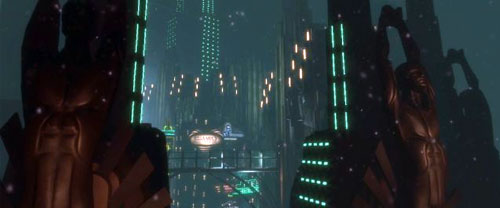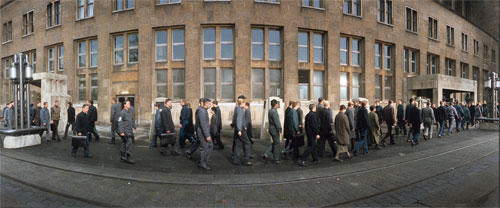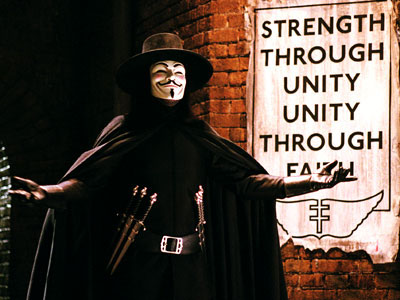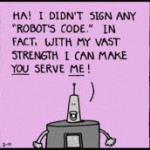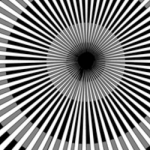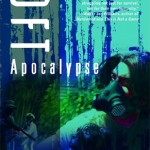
People have been dreaming of the perfect society since long before Sir Thomas More wrote his book Utopia in 1516. Over the centuries and still today people wonder, speculate, and try to create the perfect society, although in some cases this leads more towards calamity than utopia. Both utopia and its antithetical counterpart dystopia have long be themes in literature and have been the subject of many a science fiction story. Based on name alone, these two subjects seem as though they are completely different, but as we explore what they mean and how they fit in with the science fiction genre we will explore their similarities as well as their differences.
When we discuss utopia, instant images come to mind: Blue sky, people lazily lounging around, not a care in the world, off somewhere a bird is singing and life is grand. The word “utopia”, which was created by Sir Thomas More to be the name of his fictional island, is derived from two Greek words. The first is “Outopia” meaning “no place” and the second is “Eutopia” meaning “good place”. The name itself seems to imply the futility of such a place, or such an existence, but that hasn’t stopped men and women, writers and rulers alike from dreaming of such an arrangement. The word “utopia” has come to mean a perfect but unreachable society, something that we strive for but can never quite attain.
What separates writings on and about Utopian societies and a political or philosophical debate? Most works which describe a Utopian setting are written with a lack of regard or notice to whether or not removing the evils of societies is even possible. It is written as a fictional account, of either discovering or being described by another, but not how it is actually possible to attain such a society (Mastin). Science fiction perhaps more than any other genre in fiction explores, if you’ll excuse me, places where “no man has gone before”. Constraints of reality and what is really possibly versus what could be, what might be, and any other possible scenario imaginable can be explored through science fiction.
Utopia is less the perfect political system and more stepping away from society and civilizations. It calls for the creation of practical and necessary improvements. Why upgrade the infrastructure when you could spend your time improving the plumbing so that everyone has water? However, this is a practice best practiced in fiction. In the eighteenth and nineteenth century many communities based on the Utopian philosophy were founded, and most of them failed. The Utopian ideal fails when it is enforced by politics.
The development of utopia in fiction has lead to dystopia. When utopia isn’t relevant what do you have left? In our current society the rich have no urgency for the perfect lazy carefree life, and for the destitute, there seems no way out of a life of violence and poverty. People become both complacent and jaded towards the lofty aspirations of utopia. Others so desperate for that utopia try to enforce it with an iron fist. This is the genesis of dystopia (Jacoby, 1-6).
In Ayn Rand’s Anthem, the main character Equality 7-2521is assigned to be a street sweeper because he transgressed against the natural order by being inquisitive when he hadn’t been assigned to be a Scholar. Children are raised en masse, jobs are assigned, and supposedly everyone is equal (Rand). Anthem is not the only example in dystopian fiction of this forced utopia, nor was it the first or will it be the last. In Yevgeny Zamyatin’s We
, every action performed by a person is prescribed by “The Table”, everyone wears the same uniform, and surgery is even performed in some cases to change physical features to more closely resemble those of the rest of the population (Zamyatin).
If Utopia is ultimate contentment, then dystopian fiction is necessarily told from a malcontent point of view. The narrator is often speaking as a member of the society, originally content with their position until an epiphany causes them to realize that everything isn’t perfect. In Anthem Equality 7-2521 rediscovers electricity and furthermore the light bulb, however rather than being heralded as a bright new mind he is chastised for attempting to ruin the equilibrium of society. His epiphany comes when they try to destroy what he has created, and suddenly he realizes that the society isn’t perfect and ideal but repressive and unequal (Rand). D-503 the main character of We meets the enigmatic I-330 who exposes him to new ideals and causes an inner conflict between his past ideals and the new dreams and thoughts bubbling up in him because of what she has exposed him to (Zamyatin).
Utopian and Dystopian fiction seem very different, but there are some similarities. Both exhibit extremes, one overly hopeful, the other overly ominous. Utopians are the dreamers for what might be, while dsytopian fiction is more of a nightmare, and it is a less whimsical idea of what might be. Both societies aspire for absolute equality and for a better tomorrow, even if their approaches are completely different. There could not be dystopia without desire of a utopia. After all, the society in We was structured to make everyone content, and the goal was a perfect society. There could not be utopia if not for fear for the overbearing nature of dystopia.
These two ideals have been thought about and discussed for centuries, perhaps even as long as there have been civilizations. Science fiction is the playground for would-be philosophers to explore the political possibilities that may not have any real world application, or may not even be practicable in reality. As long as there is a political system there will be people who will want to see it changed and who will want revolution or evolution. In these conditions, the emotions and thoughts that drive the Utopian belief or the Dystopian outcome will continue.
Utopian Fiction:
- Utopia
by Sir Thomas More
- Always Coming Home
by Ursula K. Le Guin
- Men Like Gods
by H.G. Wells
- Ecotopia : the notebooks and reports of William Weston
by Ernest Callenbach
- Old New Land (Altneuland)
by Theodor Herzl
- Unveiling a Parallel: A Romance
by Alice Ilgenfritz Jones and Ella Merchant
- Herland and Selected Stories
by Charlotte Perkins Gilman
- Macrolife: A Mobile Utopia
by George Zebrowski
- The Probability Broach
by L. Neil Smith
- White Mars
by Brian Aldiss
Dystopian Fiction:
- Atlas Shrugged
by Ayn Rand
- The Bar Code Tattoo
by Suzanne Weyn
- Brave New World
by Aldous Huxley
- The Sheep Look Up
by John Brunner
- The Postman
by David Brin
- Memoirs Found in a Bathtub
by Stanislaw Lem
- Jennifer Government
by Max Barry
- Elvissey
by Jack Womack
- Uglies (Boxed Set)
by Scott Westerfield
- Rant: The Oral Biography of Buster Casey
by Chuck Palahniuk
Resources:
- Jacoby, Russell. Picture Imperfect : Utopian Thought for an Anti-Utopian Age. New York: University of Tokyo P, 2005.
- Mastin, Luke. “Development of Utopian Literature.” Utopian Literature. 13 Dec. 2008 http://www.lukemastin.com/utopia/development.html.
- Rand, Ayn. Anthem. New York: Tarcher, 2000.
- Zamyatin, Yevgeny. We. Trans. Clarence Brown. New York: Penguin Classics, 1993.


